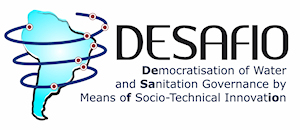Assumptions & Rationale
DESAFIO departs from the assumption that successfully tackling the challenges facing Brazil and Latin America more generally in relation to the sustainable universalization of access to safe water and sanitation services requires fundamentally radical -that is, that go to the roots of the problem- socio-technical solutions. This requires breaking with the prevailing status quo dominated by technology-centred, top-down, often paternalistic and even authoritarian solutions. It also requires going beyond the dominant situation whereby international organizations and donors, to mention just some of the key players in the field, pay lip service to such technical innovations as low-scale water and sanitation services systems (e.g., Brazil’s condominial system, Paraguay’s water vendors, etc.) but in practice continue to favour the reproduction of a status quo that privileges short-term interests over the needs of the poor and very poor.
There is a need to make policy and technology subservient to the higher goals of achieving efficacy and effectiveness, not just efficiency, in the delivery of water and sanitation services if we are going to achieve the Millennium Development Goals, not to say the full universalization of water and sanitation services and other essential services. For instance, the analysis of the evidence emerging from recent reports suggests that even in cases where access to water has been improved in some ways, there is a need to address the problem of water quality. Innovative socio-technical interventions are required, including technological advances and innovative survey methods, to provide the tools for rapid, reliable and cheap monitoring of water quality to be carried out on a large scale, especially in vulnerable communities.
In this scenario, appropriate technologies that allow improving the supply and quality of water and reclaiming, recycling and reusing water, within the local environmental and socio-economic constraints, should thus be vigorously promoted. As already discussed, the situation is even more complex in the case of sanitation. The successful development and uptake of these socio-technical innovations requires a bottom-up approach with the active involvement of the local communities and other relevant actors in all stages of the research-action process, from the inception through the design, implementation, monitoring, and validation process.
DESAFIO also aims to make a substantial contribution towards a better understanding of the requirements, opportunities, obstacles, factors and processes that allow the successful implementation of socio-technical solutions through effective governance practices. It is widely acknowledged that the design of policy strategies oriented at producing social transformation, particularly among vulnerable populations, requires coordinated action at different levels (subsidiarity principle), with public participation by all sectors (active citizenship), including women and children, transparency, and accountability. We aim to produce knowledge about the economic, socio-political, cultural and policy-institutional structures needed in each of the participating communities in order to develop adequate socio-technical innovations that generate alternative scenarios of economic and social development in the area of water and sanitation services management.
This will allow us to identify the existing barriers and opportunities for enhancing the access to water technologies, especially for those sectors of the population who are the main targets of the Millennium Development Goals, the poor and the most vulnerable sectors, in particular women (who usually bear the burden of the household’s social reproduction). By working closely with the communities themselves, as well as with local authorities and other power holders, we expect to facilitate a process of dialogue and cooperation between sectors that continue to work often in isolation (e.g. basin authorities and water and sanitation services managers), which is one of the main impediments to success in these policy areas.
DESAFIO will also foster our ability to harness existing and developing new appropriate and innovative socio-technical solutions for the provision of safe WSS. It will also facilitate the transfer of technologies and good practices and develop recommendations on how the socio-technical solutions under consideration can be supported and implemented in different socioeconomic and cultural contexts in Brazil, Latin America and other southern countries.













